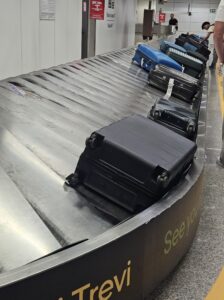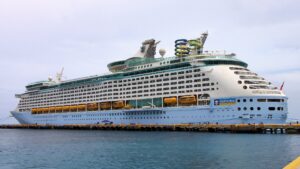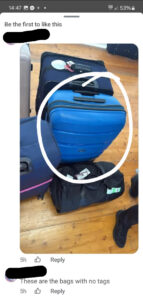Companies that sell high value products or services in competitive industries need to be able to differentiate their offerings in order to persuade us, the consumers, to choose them. It might be exclusive variants, or value-added extras, first class customer service, or first class post-sales service. Recent experience with two global giants in their field suggests that first class post-sales service is on the decline, that once a company has your business and concluded the to-the-letter portion of their responsibilities they feel their job is done, and that post-sale issues or complications aren’t worth their time, money, or reputation to fix.
My two recent poor experiences were from a cruise company and from an airline, and both involve luggage.
Example 1
I’ve had poor service on numerous occasions from British Airways, and years ago determined that I would avoid using them wherever possible. Most of my long-haul flights are now through Virgin Atlantic or one of their partners, but sometimes it’s not possible to avoid BA due to routes, availability, etc.
In July I flew with my family to Rome with British Airways. We started out at Manchester, and changed at Heathrow, with BA sending our 3 checked cases all the way. We also had two checked electric wheelchairs and a significant amount of carry-on (which you can often get travelling with two disabled family members). Luckily, none of the carry-on bags nor the wheelchairs were affected.
 On arriving at Rome, none of our checked luggage had arrived. BA’s local luggage partners told us that two of the cases were on the next flight (2 hours later) and they had no idea about the third, so we filed a report. They also told us that whenever the third case arrived (assuming it did) we’d have to collect it from the airport, as they don’t forward luggage. As our hotel was an hour away, we sat in the terminal, waiting for the next flight to arrive. The two cases arrived, and we made our way to our hotel. We were staying for 2 nights before boarding a cruise ship on the morning of the third day.
On arriving at Rome, none of our checked luggage had arrived. BA’s local luggage partners told us that two of the cases were on the next flight (2 hours later) and they had no idea about the third, so we filed a report. They also told us that whenever the third case arrived (assuming it did) we’d have to collect it from the airport, as they don’t forward luggage. As our hotel was an hour away, we sat in the terminal, waiting for the next flight to arrive. The two cases arrived, and we made our way to our hotel. We were staying for 2 nights before boarding a cruise ship on the morning of the third day.
Early the following morning I called BA who told me the third case was stuck at Heathrow, and that they’d update the tracking information we’d been given when it was on its way. I spent the day regularly checking the tracking as we were leaving on the ship the following morning.
Eventually the tracking updated to say the case would be on a specific flight later in the day. Note: they had found our case early in the morning, prior to the first flight out of Heathrow to Rome. They put the case on an evening flight — the fifth one of the day.
As I’m the primary carer for our kids I didn’t feel I was able to spend significant time trying to navigate the public transport system in country where I don’t read or speak the language, in order to get to the airport (and why should I? This was BA’s fault and responsibility) so I took a taxi to and from the airport to collect the case — one hour each way, so it still took over 2.5 hours out of my holiday to fix the problem caused by BA. I arrived at the airport 2 hours after the stated flight had landed, and expected it to be in the care of BA’s luggage partners, but it was still circling the carousel.
But at least we had our last case, which contained some expensive items, and some less expensive items that couldn’t easily be replaced.
We enjoyed our holiday and returned to the UK.
When we got back I sent in a claim to BA for the cost of retrieving my luggage. BA’s response to the claim was that, even though they put our luggage on 2 separate flights (neither of which were the flights we were on) and even though we incurred significant costs in retrieving one of the cases (which, again, was due solely down to BA not providing the service they promised us when we booked) they felt their responsibility did not extend to covering the cost of us getting our case back from them, the we should pay for their poor service.
 I took legal advice (thank you Which? Legal Helpline) and because I part-paid for the flights with a credit card I took out a Section 75 claim with the credit card company. This can cover consumers for consequential loss when a service provider does not provide the service (or the full service) they were supposed to.
I took legal advice (thank you Which? Legal Helpline) and because I part-paid for the flights with a credit card I took out a Section 75 claim with the credit card company. This can cover consumers for consequential loss when a service provider does not provide the service (or the full service) they were supposed to.
This is a frustrating route as, even if the claim is approved and the moneys returned by the credit card company, the credit card company might not be able to get the money back from the original service provider (in this instance, British Airways), so while the consumer is made whole, BA is never penalised for their shocking service. I hate that a credit company may be on the hook for the money that BA should be refunding, but rather them than me.
It seems unbelievable to me that a company with turnover in the tens of billions of pounds can get away with making their customers pay for their mistakes—mistakes that they don’t even deny.
A positive response from British Airways would have made me question my ongoing choice to not use them on my three long haul trips per year, but they’d at least confirmed that my earlier choice to send all my business to one of their competitors was the right decision.
The Section 75 claim is currently still in progress. It’s been 4 weeks since the claim was filed, and it could take up to another 4 weeks. So, we’ll see. If it’s denied, then it’ll be time to escalate it to the Financial Ombudsman. Time will tell…
Example 2
 So, complete with all our luggage (albeit several hundred euro down, after reclaiming it from the airport) we boarded the ship for our first ever cruise (which cost us around £7,000 for a week). Seven days around Europe with Royal Caribbean on their excellent ‘Voyager of the Seas’ ship. The food and food service on the ship was passable (truly excellent in the main dining hall, passable in the enormous buffet, appalling in the street café) and the porter staff who looked after us and our rooms were fantastic. The stops at various ports were also great, and we found several cities we’d be happy to visit again for longer breaks. The quality of some of the food aside we also decided we’d like to book again (even on the same route).
So, complete with all our luggage (albeit several hundred euro down, after reclaiming it from the airport) we boarded the ship for our first ever cruise (which cost us around £7,000 for a week). Seven days around Europe with Royal Caribbean on their excellent ‘Voyager of the Seas’ ship. The food and food service on the ship was passable (truly excellent in the main dining hall, passable in the enormous buffet, appalling in the street café) and the porter staff who looked after us and our rooms were fantastic. The stops at various ports were also great, and we found several cities we’d be happy to visit again for longer breaks. The quality of some of the food aside we also decided we’d like to book again (even on the same route).
On our last evening we (along with every other passenger on the ship) were instructed to leave our cases outside our rooms with the luggage tags we were given. These tags had numbers on them and told the ship’s staff in which section to put the cases the following morning at the port for us to collect after leaving the ship. This we did.
After disembarking we got to the luggage area and found just two of our three cases. This holiday was following a theme! We look everywhere (including a section specifically put aside for cases without tags) but that one case remained missing. As we had a flight booked home we couldn’t stay, so we filed a report (getting used to that!), took our two found cases and boarded the coach for the transfer to the airport. A least two other families on that same coach also had luggage missing!
 When we got home, my wife (who was on a Facebook group for holidaymakers on the same cruise as us) saw that someone who left after us had taken a photograph of a set of 5 or 6 cases that were left behind with no luggage tags. With the tens of thousands of cases the staff must handle after each voyage it’s unsurprising that some tags will get lost, due to cases rubbing against walls, or other cases.
When we got home, my wife (who was on a Facebook group for holidaymakers on the same cruise as us) saw that someone who left after us had taken a photograph of a set of 5 or 6 cases that were left behind with no luggage tags. With the tens of thousands of cases the staff must handle after each voyage it’s unsurprising that some tags will get lost, due to cases rubbing against walls, or other cases.
We had a link to a portal for tracking our case and for adding any extra information. So, the same day we left the ship I was able to upload the photograph of the cases that had been left and even circled our case for ease of finding.
Two weeks later the semi-regular auto-updates from Royal Caribbean said that our case had still not been found.
I found some Royal Caribbean email addresses online (they turned out to be the email addresses of the global CEO, COO and other board-level staff) and sent in a complaint.
Less than 90 minutes later I got an email saying our case had been found, and would I like it back? If I wanted it back it would cost me €226 (about £196) for carriage.
Cue another email to the board members. Why should I pay nearly £200 due to a problem at their end?
A few days later a call from the Royal Caribbean Executive Office. As a gesture of goodwill (not because they admit that returning my case that they mislaid was their responsibility, you understand) they would waive the charge. I politely suggested that as my case had now been missing for over half a month, perhaps they might throw in a little something extra by way of apology—a discount on our next cruise, perhaps (at this stage I was still willing to entertain that possibility). But, no. They offered a bottle of wine and a few chocolate-covered strawberries when we next sailed with them. I declined their offer.
It took another 3 weeks for the case to reach us. Over 5 weeks from when we ended our holiday. When it arrived it was unlocked (after a month without it I can’t be sure if anything was missing) and the few wet things that were in there (some expensive towels and a dress) that we were expecting to wash the same day we got home were literally covered in mould and mildew. We’ve managed to save the dress. The towels are still borderline.
So, another example of a company that refuses to accept that it’s their responsibility to take care of the possessions left in its care, and that expects its customers to pay out more money to solve its mistakes.
Had the case been returned in good time, had the company acknowledged it was at fault and waived the carriage charges without trying to make it sound like they were doing me a favour, and had they offered even a small incentive to rebook by way of apology/compensation, I would now be researching our next cruise with them, and thinking that our £7,000 holiday with them might be a regular thing. But now I’ll be looking at other cruise companies. And yes, they might all be the same, and offer the same lack of post-sales service, but they might not. Or they might not mess up in the first place.
So, why do these companies do this? Why risk alienating customers?
Because they’re big enough that they can literally choose to not care about their customers. There are always more customers around the corner.
If you’re a £10-£20 billion company, the loss of three return flights a year won’t even register. It’s so insignificant as to not even be the smallest percentage of the smallest blip on their radar. And they regularly oversell flights, anyway. My moving to Virgin Atlantic from British Airways makes literally zero difference to them. They don’t care because they can afford to not care. And for Royal Caribbean? The same. They also regularly oversell. The loss of one family’s business is of no concern to them. Big business stamp is happy to stamp all over its customer base because they know there are more customers around the corner, so why bother spending money to keep their customers happy?
It’s frustrating because even though Royal Caribbean eventually paid for our case to be returned (well over a month after our holiday) they did so begrudgingly, and not out of a sense of fairness. And British Airways? They never considered for one second whether their neglect should be fixed by them. Neither company will suffer from my moving my business away from them, so why move my business? Because giving money to a company that has shown you contempt is a form of masochism. And you only have yourself to blame when they inevitably do it again.

So, until Virgin Atlantic do me wrong and refuse to make it right (which they absolutely might), I’ll be flying with them wherever possible. I can’t even choose to fly UK-USA return with American Airlines or any of the other One World airlines, because BA would get the same amount of money if I flew with American as if I flew with BA due to the joint business venture with the One World airlines.
I’ll also be seriously researching other cruise companies.
At the end of the day refusing to reward sub-par service isn’t just good consumerism—it’s a matter of principle.